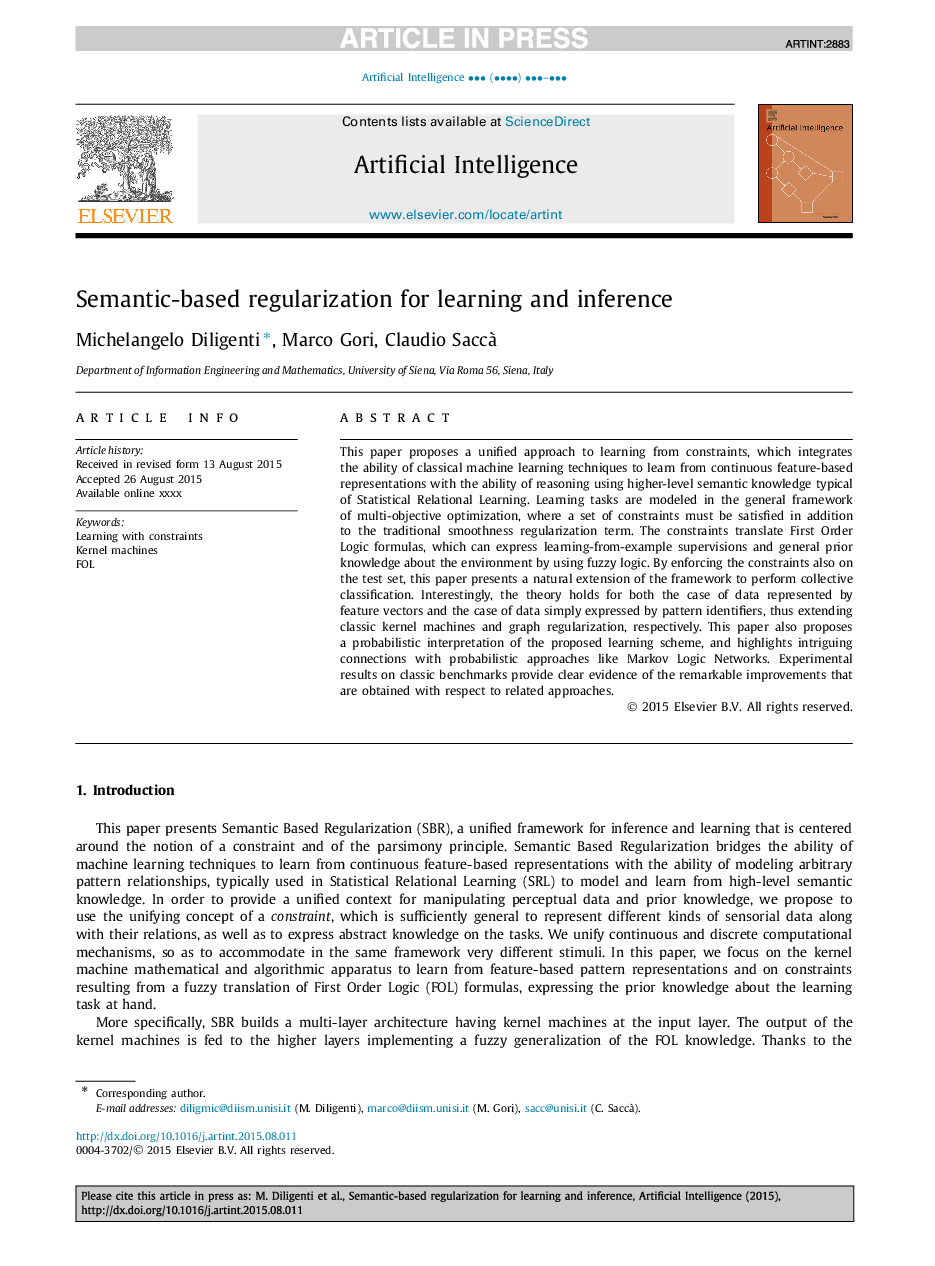| کد مقاله | کد نشریه | سال انتشار | مقاله انگلیسی | نسخه تمام متن |
|---|---|---|---|---|
| 4942065 | 1436988 | 2017 | 23 صفحه PDF | دانلود رایگان |
عنوان انگلیسی مقاله ISI
Semantic-based regularization for learning and inference
ترجمه فارسی عنوان
مقررات مبتنی بر معنایی برای یادگیری و استنتاج
دانلود مقاله + سفارش ترجمه
دانلود مقاله ISI انگلیسی
رایگان برای ایرانیان
کلمات کلیدی
ترجمه چکیده
این مقاله یک روش یکپارچه برای یادگیری از محدودیت ها ارائه می دهد که توانایی تکنیک های یادگیری ماشین کلاسی را برای یادگیری از بازنمایی های مستمر مبتنی بر ویژگی با توانایی استدلال با استفاده از دانش معناشناختی سطح بالا معمولی از یادگیری آماری مرتبط ارائه می دهد. وظایف یادگیری در چارچوب کلی بهینه سازی چند هدفه مدل سازی می شوند، که در آن علاوه بر اصطلاح اصلاح سنتی صلح باید مجموعه ای از محدودیت ها را نیز رعایت کند. محدودیت ها فرمول های منطق سفارش اولیه را ترجمه می کنند که می توانند از طریق استفاده از منطق فازی، یادگیری از نمونه های نظارتی و دانش پیشین کلی در مورد محیط را بیان کنند. با اجرای محدودیت ها بر روی مجموعه آزمون، این مقاله فرمت طبیعی چارچوب را برای طبقه بندی جمعی ارائه می دهد. جالب توجه است که این نظریه برای هر دو مورد داده های ارائه شده توسط بردارهای ویژگی و مورد داده ها به سادگی بیان شده توسط شناسه های الگو، به این ترتیب گسترش ماشین آلات کلاسیک هسته و تنظیم مقداری گراف است. این مقاله همچنین یک تفسیر احتمالی از طرح یادگیری پیشنهاد شده را پیشنهاد می دهد و اتصالات جذاب با رویکردهای احتمالی مانند شبکه های منطق مارکوف را برجسته می کند. نتایج تجربی در معیارهای کلاسیک، شواهد واضحی از پیشرفت قابل توجهی که در رابطه با رویکردهای مرتبط به دست آمده است، ارائه می شود.
موضوعات مرتبط
مهندسی و علوم پایه
مهندسی کامپیوتر
هوش مصنوعی
چکیده انگلیسی
This paper proposes a unified approach to learning from constraints, which integrates the ability of classical machine learning techniques to learn from continuous feature-based representations with the ability of reasoning using higher-level semantic knowledge typical of Statistical Relational Learning. Learning tasks are modeled in the general framework of multi-objective optimization, where a set of constraints must be satisfied in addition to the traditional smoothness regularization term. The constraints translate First Order Logic formulas, which can express learning-from-example supervisions and general prior knowledge about the environment by using fuzzy logic. By enforcing the constraints also on the test set, this paper presents a natural extension of the framework to perform collective classification. Interestingly, the theory holds for both the case of data represented by feature vectors and the case of data simply expressed by pattern identifiers, thus extending classic kernel machines and graph regularization, respectively. This paper also proposes a probabilistic interpretation of the proposed learning scheme, and highlights intriguing connections with probabilistic approaches like Markov Logic Networks. Experimental results on classic benchmarks provide clear evidence of the remarkable improvements that are obtained with respect to related approaches.
ناشر
Database: Elsevier - ScienceDirect (ساینس دایرکت)
Journal: Artificial Intelligence - Volume 244, March 2017, Pages 143-165
Journal: Artificial Intelligence - Volume 244, March 2017, Pages 143-165
نویسندگان
Michelangelo Diligenti, Marco Gori, Claudio Saccà ,
